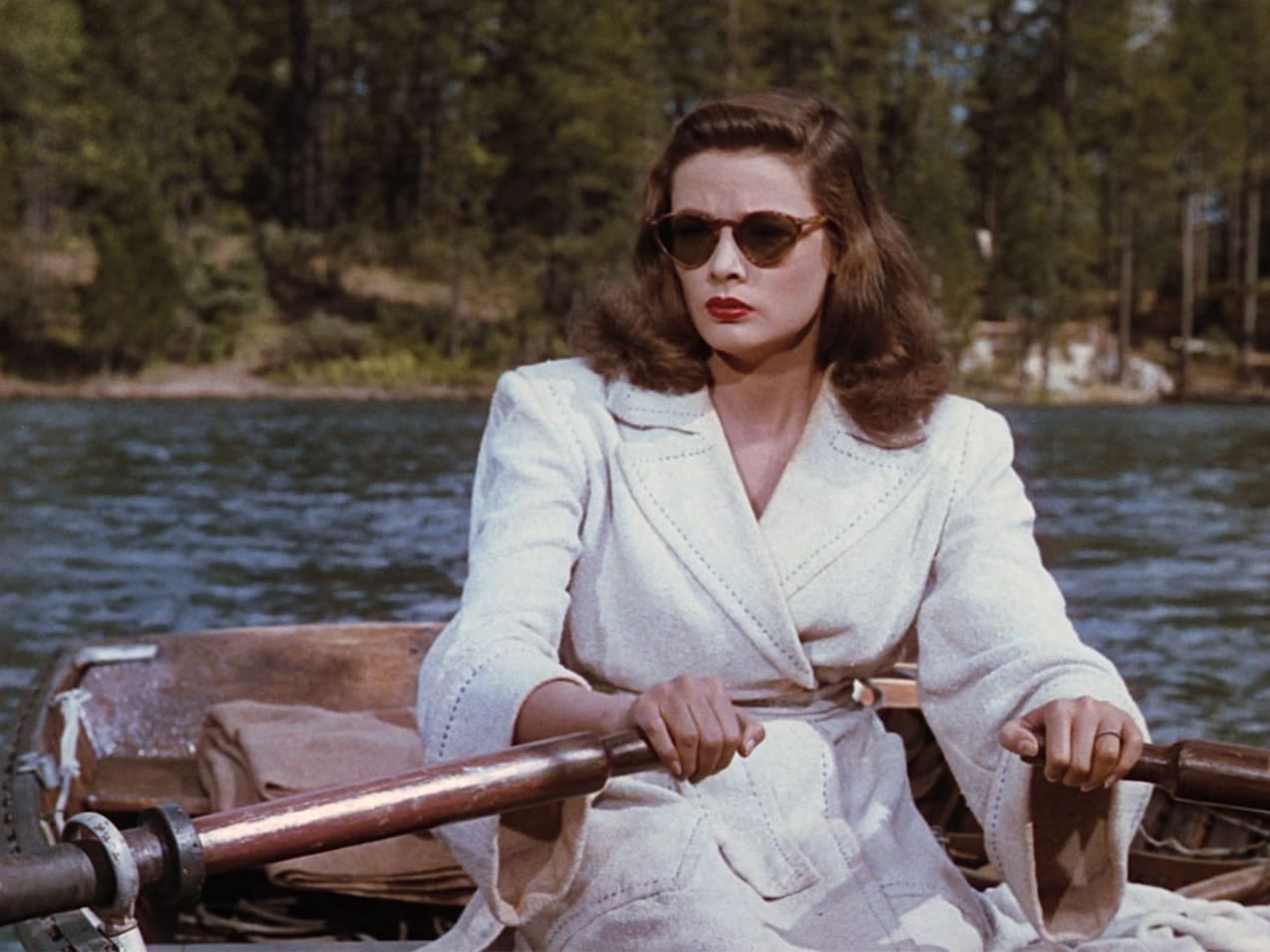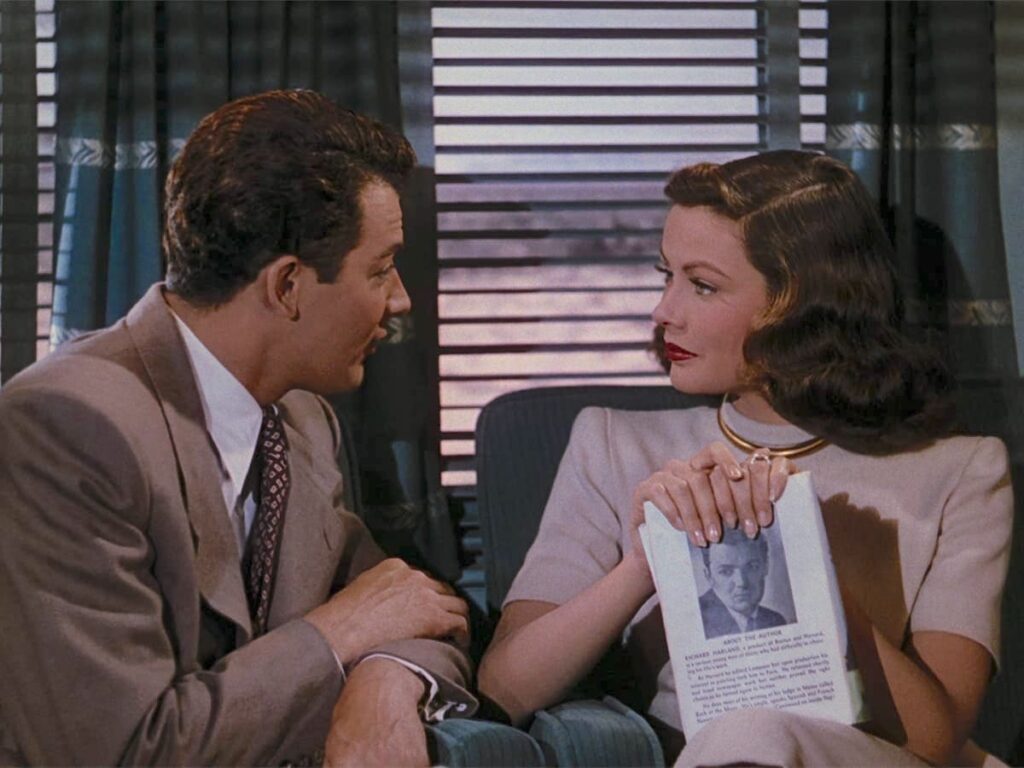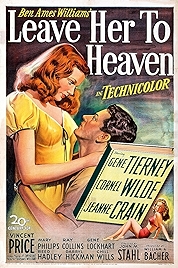Psycho wife alert, Leave Her to Heaven is melodrama of the first order, dressed to the hilt, played to the max and with Technicolor looks so lush that they border on the histrionic. If there’s an award for the best-looking film ever made, this has to be a contender.
It’s a Darryl F Zanuck production and it looks like he’s taking aim at rival David O Selznick’s Gone with the Wind in terms of production values and storyline – an unhinged woman whose psychosis is so destructive it leaves a trail of broken people in its wake.
Poor unwitting writer Richard Harland (Cornell Wilde) glimpses beautiful Ellen (Gene Tierney) on a train and is immediately transfixed by her looks, her style and her wit. He makes a move on her, unaware she’s already engaged to would-be politician Russell Quinton (Vincent Price). Not wasting any time, Ellen makes an assessment of Richard. He’s rich and successful and she decides to trade up, instantly dropping Quinton and then embarking on a treat-’em-mean strategy to snag Richard, out-manoeuvring him all the way to the altar.
Only after the wedding day does it gradually start to emerge what sort of woman Richard has married – one who wants her husband for herself and will brook no compromise. If anyone gets in the way they get hurt. Collateral damage including Richard’s gee-willikers brother Danny (Darryl Hickman), Ellen’s own adopted sister, Ruth, and the baby Ellen will later carry. Ellen keeps this psychotic vision of a happy marriage on the road with a bland mask of wifely devotion and lashings of plausible deniability.
The big argument about Leave Her to Heaven is whether it’s a melodrama or a noir. It’s a Dewey Classification-era debate in many ways – which single category must we slot this into, in the big card-indexed, systematic way of librarians of yore. But we don’t live in the Dewey world any more and that debate is now as old hat as the phrase old hat. It’s a #melodrama, it’s a #film noir. In the 21st century you can tag it any way you like, as often as you like, the more the merrier.
Clinging to the old ways, personally I’d shade towards melodrama. With noir the characters (the white knight, the femme fatale etc) drive the plot; with melodrama the plot drives the characters. In melodrama character integrity and psychological plausibility often get left behind and that’s often the case with Leave Her to Heaven. And though Ellen is in many ways the noir female (dangerous and independent, or dangerous because independent), look at the way she is treated by her family, who have known, it later turns out, she is bonkers all along but have carried on dealing with her as if she were normal. They have to do that because otherwise the plot wouldn’t work.
Richard, for his part, is painfully slow in coming round to some understanding of what he’s married. Maybe the sex is so good that he’s blinded by it. That would explain things a bit if the sexual angle was explored. But it isn’t, beyond a vague Freudian reference to Ellen’s fetishisation of her father, and the fact that Ellen always refers to Richard by his nickname. She can’t get enough Dick.
Moving beyond the cheap gag, Leon Shamroy’s cinematography is a thing of wonder. It’s astonishingly bright and lush and insanely colourful, like a 1950s postcard come to life. Leave Her to Heaven foreshadows the lip-quivering candy-coloured looks of a 1950s Douglas Sirk movie like All That Heaven Allows. It is the post-Second World War economic upswing rendered in celluloid and it won Shamroy an Oscar.
There is a one, two, three to this movie. After the cinematography comes the mis-en-scène – the physicality of locations, clothes, buildings – and together they present a fabulous picture of how the other half lives. Ellen’s rich family are not decadent capitalists but blessed winners in the American Dream. And after that the performances, with Tierney most obviously the star, giving a tour of the outer limits of mental wellness. Cornell Wilde plays Richard as a bit of a plank, which Richard would have to be not to spot which way the wind is blowing. Jeanne Crain is well cast as Ellen’s sort-of sister, the good witch to Ellen’s bad – they even look similar. And Vincent Price, still in the “wonky male” stage of his career before he took the next step and gave himself to horror, gets his chance to let off a few fireworks in the big trial scenes that conclude the film. As the hectoring DA (a political position in the USA) prosecuting Richard for murder he is spectacular, the beta male getting his revenge on the alpha who displaced him.
It’s a big, mad film which doesn’t quite stack up psychologically but bounces along so speedily, thanks to slick direction by John Stahl, that there isn’t really time to complain. Martin Scorsese loves it, and has admitting to raiding it twice for its looks – for New York New York and The Aviator. He also says he watches it again every couple of years. It is worth it.
Leave Her to Heaven – Watch it/buy it at Amazon
I am an Amazon affiliate
© Steve Morrissey 2023



I never heard of this film but have just ordered it based on your review. I watched Shutter Island last night and did a search in your site Scorsese and this came up.
Hi Sam, I’m assuming you’re the Sam I know???? Either way, it’s a dead weird film but then Gene Tierney seemed to have that effect. Laura being the most classic example. I would watch it for the pretty pictures alone. The rest is a bonus.